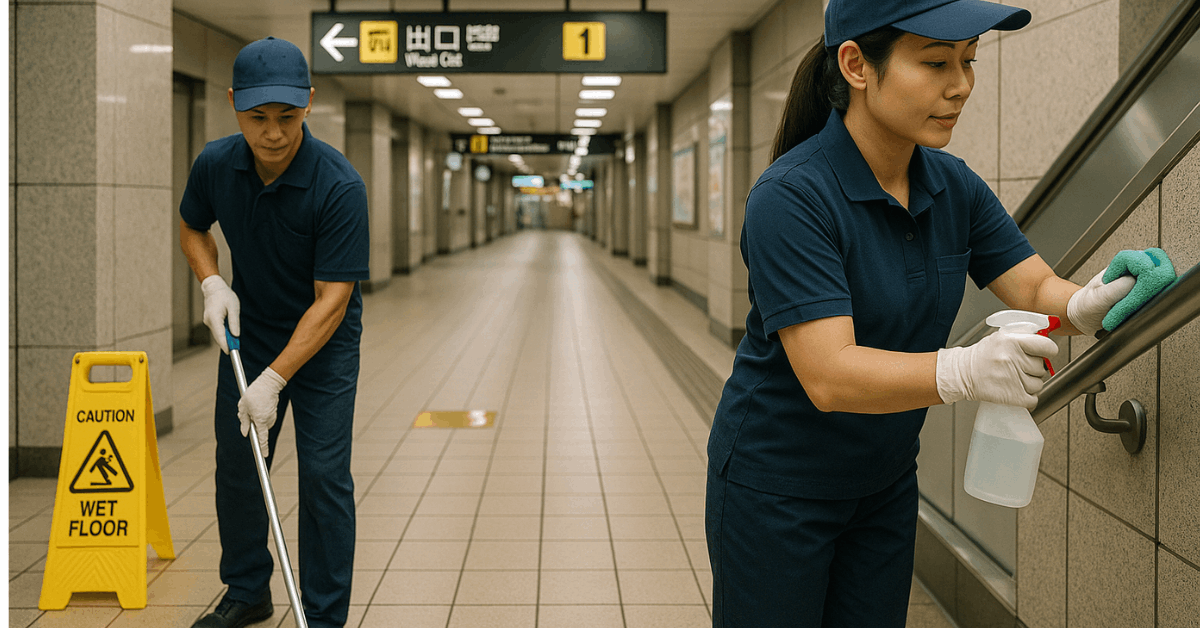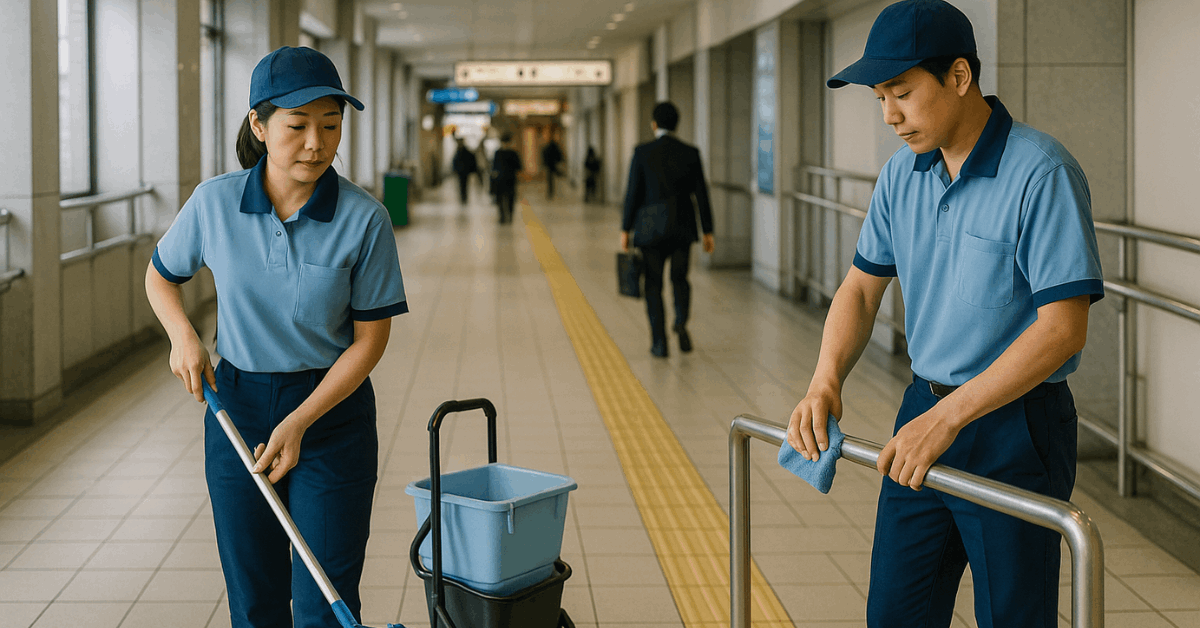Japan values cleanliness and a strong work ethic, creating steady demand for cleaning staff. The phrase cleaning jobs in Japan includes work in hotels, offices, and homes.
These positions offer stable income and cultural learning opportunities. It’s an ideal starting point if you seek reliable employment and growth in Japan.
Understanding the Cleaning Industry
The cleaning industry in Japan is well-organized and respected for maintaining hygiene in public and private spaces. Many foreigners choose this path because it requires minimal experience and offers immediate employment.
You’ll find opportunities in various environments — from hospitality to healthcare. Each role emphasizes discipline, attention to detail, and teamwork.
Growing Demand and Job Diversity
Japan’s tourism, aging population, and strict hygiene standards drive the high demand for cleaning staff. Positions are available in hotels, offices, factories, hospitals, and homes.
Workers can select between full-time or part-time schedules depending on their visa type. The need for cleaners continues to expand in both urban and rural areas.

Why It’s Easy to Start?
Most employers provide training, so prior experience isn’t required. Basic Japanese language skills are helpful but not mandatory for many entry-level positions.
What matters most is reliability and a willingness to learn. Many companies hire foreigners through direct applications or job agencies.
Common Types of Cleaning Jobs
There are many categories of cleaning work available across Japan. Each role has distinct responsibilities, work environments, and pay rates. Below are some of the most common and in-demand cleaning positions for locals and foreign workers.
Hotel Room Cleaner
Hotel cleaners are responsible for maintaining guest rooms and common areas. Tasks include changing linens, cleaning bathrooms, and restocking supplies.
The average pay ranges from ¥1,100 to ¥1,400 per hour, depending on the hotel. This role is ideal for detail-oriented workers who enjoy structured routines.
Office and Building Cleaner
Office cleaners maintain corporate environments by sanitizing desks, hallways, and restrooms. Most shifts happen early in the morning or after business hours.
Wages range between ¥1,050 and ¥1,300 per hour. These jobs often include regular working hours and access to transportation allowances.
Residential Housekeeper
Housekeepers clean private homes and sometimes assist with cooking or laundry. Monthly salaries average ¥200,000 to ¥250,000, depending on location.
It’s a great choice if you prefer personal work environments and stable routines. Some employers also offer free accommodation.
Requirements and Qualifications
Working as a cleaner in Japan requires both responsibility and a basic understanding of employment standards. Below are key factors that define qualifications, skills, and expectations for this type of work.
Basic Skills and Qualities
Before starting a cleaning career, understanding the key qualities employers value is important. These points summarize the essential skills needed for success.
- Good health is necessary to handle daily physical tasks efficiently.
- Attention to detail ensures that cleanliness standards are met consistently.
- Reliability and punctuality build trust with employers and clients.
- Respect, precision, and strong work ethics reflect Japan’s professional values.
Visa and Work Eligibility
For foreigners, having the right visa is important. You may work under a Specified Skilled Worker (SSW) visa, a student visa, or a dependent visa.
These options allow flexibility depending on your work schedule and residence status. Understanding visa rules prevents employment issues.
Experience and Training
Work experience can help you qualify for higher pay or better roles. Training programs cover safety procedures, proper cleaning techniques, and use of equipment.
Employers appreciate workers who learn quickly and follow standards. Continuous improvement often leads to promotions.
Personal Growth and Adaptability
Japanese companies reward dependability and adaptability. Showing initiative by helping coworkers or taking additional responsibilities can set you apart.
Flexibility with shifts or new tasks demonstrates reliability. Building these habits leads to long-term job stability and trust.
Benefits of Working in Cleaning Jobs
Cleaning jobs offer more than just income — they also bring stability and cultural experience. Many companies provide good working conditions and additional allowances.
These benefits make cleaning an appealing career path for those who value structure and steady growth.
Financial and Lifestyle Advantages
You can expect a consistent salary, with overtime pay available in many positions. Employers often cover commuting expenses and provide uniforms.
Some offer company housing or dormitories for foreign workers. Flexible shifts also allow you to balance work with other personal goals.
Professional and Cultural Growth
Cleaning work teaches responsibility, time management, and discipline — qualities valued in any Japanese workplace. You’ll also interact with locals, improving your language skills and cultural understanding.
These experiences can help you transition into better-paying roles or supervisory positions. The more you learn, the faster you advance.

How to Find Cleaning Jobs in Japan?
There are several ways to locate cleaning job opportunities effectively. The right approach depends on whether you are already in Japan or applying from abroad. Here are some reliable methods to get started.
Trusted Job Platforms
Many employers post vacancies on online platforms like GaijinPot, Hello Work, and Indeed Japan. These sites include English-language listings and filter options for foreign applicants.
Creating a detailed profile with your availability helps you get faster responses. Always verify the company’s reputation before applying.
Recruitment Agencies and Networking
Agencies help foreigners find suitable jobs and assist with the necessary documents. They also explain employment rules and workplace expectations.
You can also network through community groups or local centers. Word of mouth is often effective for finding smaller employers seeking reliable staff.
Challenges and How to Overcome Them?
While the work is rewarding, it comes with challenges like language barriers and physical demands. Adapting to Japan’s strict cleaning standards takes patience and focus. Understanding these issues helps you prepare mentally and physically before starting.
Language and Communication
Even though not all roles require fluency, knowing basic Japanese improves teamwork. Learning phrases for cleaning tasks and greetings will make daily interactions smoother.
Employers appreciate effort, even if your skills are fundamental. Free language classes for foreign workers are often available in major cities.
Physical and Cultural Adjustments
The work can be physically demanding, especially during long shifts. Staying hydrated and maintaining posture can help you avoid fatigue.
Culturally, you’ll need to adapt to Japan’s emphasis on precision and politeness. Following these standards ensures job security and good relationships with supervisors.
Future Opportunities and Salary Growth
Cleaning work can lead to long-term opportunities with higher pay and responsibility. The industry continues to grow with Japan’s aging population and tourism recovery. Ambitious workers can advance into leadership or management positions.
Career Advancement
Employees with strong performance records can become supervisors or trainers. These roles pay between ¥250,000 and ¥350,000 monthly, depending on company size.
Some workers move into facility management, which includes safety and scheduling duties. Consistent improvement opens doors to permanent residency in Japan.
Expanding Industry Trends
Automation and eco-friendly cleaning are emerging fields. Workers trained in these technologies can earn more and work in specialized environments.
The shift toward sustainable cleaning practices creates new career opportunities. The demand for skilled and adaptable cleaners remains high.
Living and Working Conditions in Japan
Most cleaning companies provide supportive and safe environments. Workplaces are well-organized, with proper tools and safety equipment. You’ll often have access to nearby transport systems and rest facilities.
Japan’s public cleanliness culture ensures a respectful work atmosphere. Some employers offer shared housing or rent support to reduce living expenses.
This is common for workers in major cities. Employers typically provide insurance and follow labor laws strictly. These benefits help maintain stability and security while working in Japan.
Building a Stable Future in Japan
Cleaning jobs in Japan provide dependable work and a chance to experience local culture. They suit those who value discipline, stability, and professional growth.
With flexible hours and fair pay, this career can lead to lasting success. Staying consistent and respectful helps you build a secure future in Japan.












